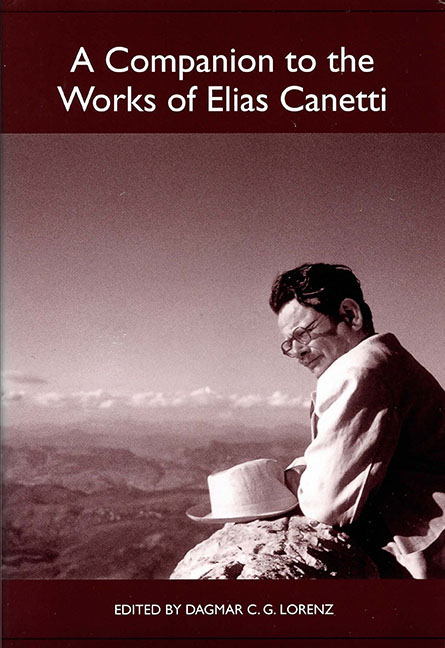Book contents
- Frontmatter
- Dedication
- Contents
- Canetti's Principal Works
- Abbreviations of Works Frequently Cited
- Introduction
- Canetti's Global Significance
- Writing and Language
- The Works: Themes and Genres
- “The Faultiest Expressions Have the Greatest Attraction”: Elias Canetti's Proverbial Aphorisms
- Canetti's Aufzeichnungen
- Staging a Critique of Modernism: Elias Canetti's Plays
- “Gute Reisende sind herzlos”: Canetti in Marrakesh
- Space in Elias Canetti's Autobiographical Trilogy
- Philosophy and Social Thought
- Historical Contexts
- Works Cited
- Notes on the Contributors
- Index
“Gute Reisende sind herzlos”: Canetti in Marrakesh
from The Works: Themes and Genres
Published online by Cambridge University Press: 28 April 2017
- Frontmatter
- Dedication
- Contents
- Canetti's Principal Works
- Abbreviations of Works Frequently Cited
- Introduction
- Canetti's Global Significance
- Writing and Language
- The Works: Themes and Genres
- “The Faultiest Expressions Have the Greatest Attraction”: Elias Canetti's Proverbial Aphorisms
- Canetti's Aufzeichnungen
- Staging a Critique of Modernism: Elias Canetti's Plays
- “Gute Reisende sind herzlos”: Canetti in Marrakesh
- Space in Elias Canetti's Autobiographical Trilogy
- Philosophy and Social Thought
- Historical Contexts
- Works Cited
- Notes on the Contributors
- Index
Summary
Although written in 1954, Canetti's notes on his trip to Morocco were not published until 1967. Herbert Göpfert, his Munich editor, maintains that this was because Canetti did not think them significant. In spite of this, reviewers of Die Stimmen von Marrakesch have complimented Canetti on his superbly classical prose and his passion for detail and immediacy, on an ability to transform apparently insignificant scenes into parables or epiphanies, on his unusual combination of sarcasm and mysticism, on his deeply felt sense of death, on his attraction to the intensity of life he was able to find in the dejected, and those children, beggars, storytellers, and blind people he comes across on his trip. Even his arch-critic Marcel Reich-Ranicki made a generous exception to this particular work, and cordially pronounced it magical, and a work of “Dichtung.”
Die Stimmen von Marrakesch certainly implies that in ordinary life there is much hidden gravity, complexity, and mysteriousness. I shall be arguing that the work also implies that receptivity — particularly the play of the eyes and the ears — is an aesthetic ritual without ethical implications. The strict separation of the aesthetic from the ethical is a questionable underlying truth that is kept obscured in Canetti's travelogue because it is concealed behind a veil of multicultural richness, in particular, evidence of the exotic Jewish and Muslim influences in Marrakesh. These doubtlessly seem doubly alluring and mysterious to readers experiencing Morocco vicariously outside Africa, as mediated textually in literary German. Individuals Canetti meets who are either Muslim or Jewish are, however, not primarily seen as representative of their Muslim or Jewish cultures. Rather, any serious discussion of the doctrines underpinning Jewish or Muslim life is dismissed or erased in favor of an aesthetic-ethical absolute, which will appeal to Canetti's Western audience. This is the secular, humanist view that life is a transient pose or performance for the eyes and for the ears of a spectator subject, in this case the writer/flâneur Elias Canetti, on holiday in Morocco from London, a cosmopolitan Jew who speaks French with the people he meets, most of whom can only manage broken French, which limits the scope for serious exchanges. Canetti, the writing subject, thus emerges as the principle protagonist of the work even though he appears so self-effacing, and the primary subjects in the stories seem to be Others different from himself.
- Type
- Chapter
- Information
- A Companion to the Works of Elias Canetti , pp. 157 - 174Publisher: Boydell & BrewerPrint publication year: 2004



